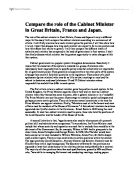The doctrine of collective responsibility in UK unlike other countries such as Austria, Finland, and Germany does not exist in a codified manner. Infact Cabinet has only been mentioned in only three Acts of Parliament (Burch and Holliday 1996). However it is without any doubt a convention of great constitutional importance (De smith and Brazier 1998). Here another question arises is this a good thing? In support of the current state of the doctrine we can look at examples of 1972 and 1979 were this doctrine was waived and Cabinet Ministers were allowed to disagree openly purely for democratic reasons this would not have been possible had the doctrine been in the form of legislature. Arguing against the current state we can look at example of 1932 when this doctrine was waived purely for political purpose which was not so bad but gives us an idea of future possibilities. Real danger of abuse can be sensed in this remark of Labour Prime Minister Mr. Callaghan “ I certainly think that the doctrine should apply, except in cases where I announce that it does not” (De smith and Brazier 1998).
The Minister concerned is not the first one to find herself in this position as Lord Birkenhead said in his speech to the House of Lords in 1928. “ I have been a member of the Cabinet with a very slight interruption for thirteen years, and I can hardly recall a single measure of first class importance on which all members of the cabinet had precisely same views” (Herman 1975). If she continues to disagree with the rest of the members of the cabinet and cannot persuade them to agree with her then she has got mainly two options. One is the conventional way of resigning like Mr. Michael Heseltine (the Defence secretary) did due to his disagreement with the cabinet and mainly the Prime Minister Margaret Thatcher during the Westland affair in 1986. Another example is that of Sir Geoffrey Howe who resigned because of his disagreement on government policy towards Europe (De smith and Brazier 1998). This way is however not practical and a way usually adapted by ministers to show there dissent with government policies has been to leak it to the media. However caution must be taken because this method has backfired in the past. A prime example of this can also be traced to the Westland affair were Mr. Leon Brittan (the Trade and Industry Secretary) leaked a letter from the Solicitor General. This leakage was not taken to kindly by the Solicitor General and after an investigation it became apparent that it was Mr. Leon Brittan who’s office had leaked the letter. As a result of his serious misconduct he had to resign.
A more recent example of a Minister ignoring his/her role under the doctrine can be seen when the Cabinet Minister responsible for Overseas Development, Clare Short, broke the tradition of Cabinet collective responsibility by speaking out against her own Government's policy on the Millennium Dome. She claimed the Dome was "a flop", despite the numerous efforts made by the government and specially another Cabinet Minister Peter Mandelson secretary of state for Northern Ireland to deny this. The outcome of her comments is yet to be seen but if the Prime Ministers choose to do so he can ignore these comments (De smith and Brazier 1998). An example of the Prime Minister ignoring comments, which are not in line with government policy, can be seen when the speeches made by Mr. Peter Walker were ignored by the then Prime Minister Mrs. Margaret Thatcher. These speeches were aimed at criticising the economic policies of the government (De smith and Brazier 1998).
However if she resigns she has got the right to publish the reason of her disagreement in her letter of resignation and even make a resignation speech in Parliament if she wishes to do so. It all depands on how strongly she supports the cause.
Now that we have discussed this doctrine to a considerable extent let us now in conclusion look at some of its advantages and disadvantages. One big advantage that we have discussed earlier is that a united cabinet means a stable government, which is of fundamental importance to the stability of the country. One possible disadvantage is that this doctrine might cause frustration among Cabinet Ministers and might result in their resignation and as a result the crown might loose a valuable servant. Another disadvantage is that the doctrine can be used as a political tool by the Prime Minister of the day. An example of which can be seen in the cabinet of John Major who was careful to ensure that both his rivals in the leadership election, Douglas Hurd and Michael Heseltine, had senior cabinet posts. By doing this he made sure that they could not criticise him publicly and all their dissent and disagreement would only be voiced during cabinet meetings. Like President Lyndon B. Johnson said “better to have them inside the tent pissing out, than outside the tent, pissing in.”







